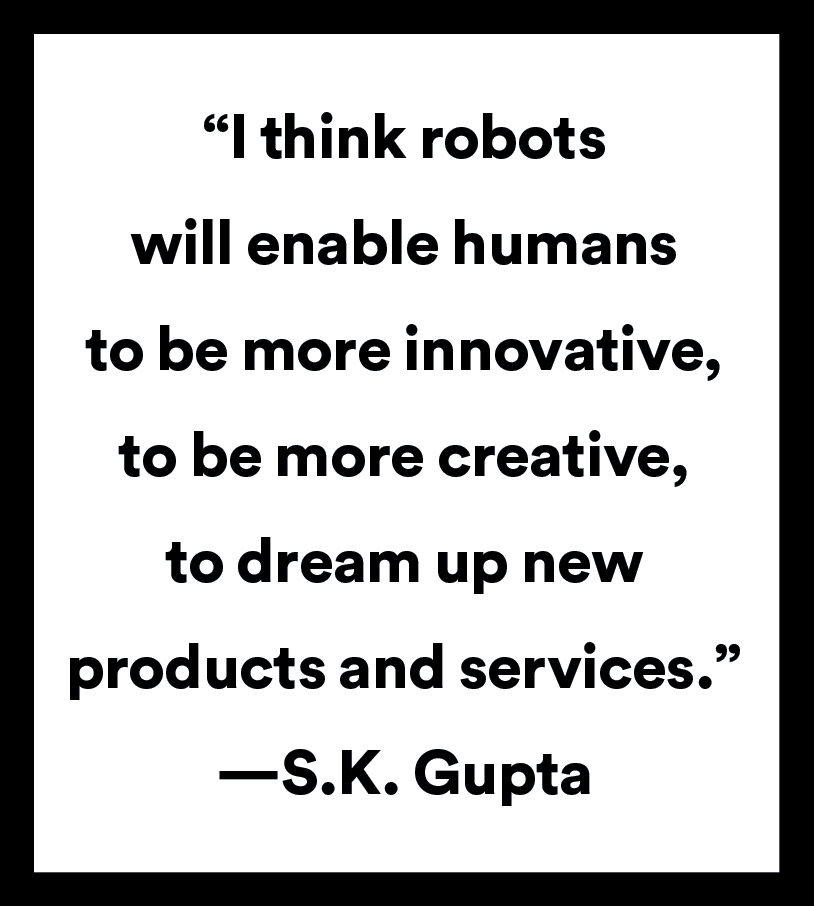Made in America
Manufacturing once served as a reliable gateway to the middle class. Blue-collar workers lived the American dream, buying homes, cars, taking vacations and sending their kids to college.
That was then.
Over the past 35 years, the United States has lost millions of well-paying manufacturing jobs. Automation, trade and offshoring have eliminated more than 37 percent of such positions since the sector peaked in 1979, according to the U.S. Bureau of Labor Statistics. Today, there are about 12.3 million furniture, textile, chemical, metal and other manufacturing jobs, down from nearly 19.6 million in June 1979. That’s a loss of roughly 7.3 million manufacturing positions, which today pay an average of $26.29 per hour, according to the BLS.
Most experts expect more of the same, with U.S. manufacturing continuing to decline. But S.K. Gupta sees it differently. Gupta, the Smith International Professor of Aerospace and Mechanical Engineering and the director of USC Viterbi’s new Center for Advanced Manufacturing, believes that advances in robotics, computing and artificial intelligence could allow the United States to reverse course and become a leader in high-end manufacturing.
“We are basically entering a new golden age of manufacturing. I think this convergence of different technologies is allowing us to create products we have never seen before,” Gupta said. “My vision is that the U.S. will be a leader in many of the high-end, highly profitable markets. In the automotive sector, the top-of-the-line cars should be made here. The same with drones, advanced batteries, driverless cars and biomedical devices.”
Gupta brushes aside dystopian fears about robotics, arguing that rather than eliminate jobs, automated high-end manufacturing creates scores of good jobs in engineering services, design, finance, construction and service positions.
Gupta speaks about engineering in almost mystical terms, awed by the process of turning ideas into tangible creations. Manufacturing, he says, is more than just producing cars, computers and clothes. It fuels economic development, creates jobs, sparks innovation and dramatically improves the standard of living. In this “new golden age of manufacturing,” robots will benefit humanity, not destroy it.
“I think robots will enable humans to be more innovative, to be more creative, to dream up new products and services,” Gupta said. “We can now make things better, cheaper and faster.”
South Korea, Japan and Germany have invested heavily in robotics and automation with encouraging results, Gupta said. Japan has become a world leader in the production of high-end machine tools, Germany in topflight appliances and cars, and South Korea in best-in-class refrigerators and televisions. In all three countries, unemployment remains relatively low, he added.
But won’t China, Mexico and other low-wage countries simply siphon away newly minted high-end manufacturing jobs? Gupta thinks not. That’s because investing in advanced robotics, despite the high upfront capital costs, “actually brings per unit labor costs down through automation,” he said. “You can make yourself relatively immune from jobs offshoring. Robots free humans from mundane work and enable them to focus on creative aspects of work.”
Gupta says that low-end American manufacturing jobs will never come back and that more such jobs will likely relocate to cheaper locales unless U.S. factories use more automation. He admits that high-end manufacturing will not replace all the lost manufacturing jobs and could, itself, lead to fewer direct jobs in manufacturing due to automation. But new jobs in related areas will be created.
Still, Gupta believes American industry must seize the initiative and invest in automation or risk being left behind. Technological breakthroughs have made high-end manufacturing cheaper and more efficient than ever.
Failure to embrace increased high-end automation, warned Jerry Power, executive director of the Institute for Communication Technology Management at the USC Marshall School of Business, would cause “our economy to suffer. Our global competition, China, Germany, Japan and others, are coming after us. The only way U.S. industries can blunt these challengers is to anticipate their moves and go after them.”
Advances in robotics allow robots to perform ever more difficult tasks and even make “smart” decisions with minimal human input. With the Internet of Things, Gupta explained, manufacturers can improve processes and prevent equipment breakdowns because “with all the sensor data coming from so many different streams, you can analyze it, you can mine it, you can correlate it.” The advent of 3-D printing, he added, allows manufacturers to make more complex components for jet engines, drones, cars and other high-end products. Finally, improved artificial intelligence can maximize efficiencies and reduce energy costs.
Sophisticated automation has allowed at least one American company to produce its high-end products domestically, noted Colin Lewis, a behavioral economist and data scientist, in the Harvard Business Review: “Thanks to one of the most advanced robotic manufacturing facilities in the world, Tesla Motors builds its electric cars in the U.S.”
Gupta became interested in automation as a mechanical engineering student in India. In 1987, he interned on a truck company’s automated assembly line. “That got me hooked,” said Gupta, who later studied manufacturing and automation as a Ph.D. student at the University of Maryland.
At USC Viterbi’s Center for Advanced Manufacturing, which opened in February, interdisciplinary scholars from across the university will collaborate on research projects, center faculty will teach the principles and theory of manufacturing, and government agencies and companies will be able to sponsor research projects.
“We want to be among the world leaders in advancing research, innovation and education in modern manufacturing, which is a synonym for making value, a key component of economic growth and prosperity,” USC Viterbi Dean Yannis Yortsos said.





